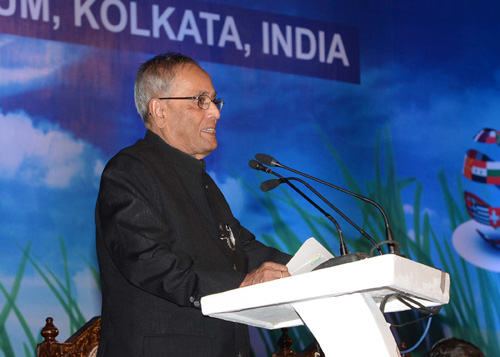
Distinguished guests,
It gives me great pleasure to be amongst you today on the occasion of the inauguration of the International Conference of the Institute of Chartered Accountants of India.
India today is part of a globalized and integrated world economy. This results in its own set of challenges and opportunities. The biggest of these challenges is to ensure inclusive growth so that those who are at the margins and the periphery of the socioeconomic ladder are able to fully benefit from newer economic opportunities. Without inclusive governance, inclusive growth cannot be achieved. Our priority is achieving inclusiveness in governance, through participative decision making, and in the economy through equitable economic growth.
In the last six decades there is much that we can be proud of. The literacy rate has increased significantly and stood at 74% in 2011. After having attained self-sufficiency, we are now net exporters of food grains. A noteworthy reduction in the incidence of poverty has been achieved. Our economic growth rate has more than trebled. The last decade, wherein India grew at an average annual rate of 7.9%, has seen us emerge as one of the fastest growing nations in the world and one whose economy is the third largest in the world on the basis of ‘Purchasing Power Parity’ (PPP). Recently, however, there have been apprehensions expressed about our growth rates going into the future. The decline in growth rates has been because of a combination of factors, both external and domestic. I am hopeful that the resilient character of the Indian economy, along with the measures announced by Government and the bountiful monsoon this year, will help reverse this short term deceleration.
The current economic environment poses many issues in the financial and accounting world and chartered accountants today have a greater role to play in advising the management and users of the financial statements. As auditors of public companies, members of the accountancy profession perform a critical function through their audit reports – a significant responsibility bestowed upon you. In fact, by discharging this responsibility in a proper manner, you create public trust not only in your profession but also in the entities you audit. A hallmark of the accountancy profession is its obligation to act in the public interest. The current spate of financial crises have only reinforced the role that the profession has to play in providing high quality financial information, facilitating market discipline and fostering confidence amongst various stakeholders in the financial markets.
Professional accountants whether in practice or working in industry should provide sound financial and non-financial information to all investors, taxpayers and stakeholders in the economy. They are also expected to provide truthful and effective communication with various stakeholders directly and indirectly related to the corporate governance processes for which they are accountable. As part of an established profession, accounting professionals must apply high standards of ethical behavior and professional judgment; work with the regulators, and the government to develop and implement high-quality professional standards for financial reporting, auditing and assurance, ethics, public sector financial reporting and accounting education. I am happy to note the various initiatives taken by ICAI to play a greater role in economic development and to uphold public confidence. The profession has moved much beyond performing merely accountancy functions, and has been contributing by giving inputs to the Government and various regulators in the areas of financial markets, taxation, corporate laws, economic laws, banking, insurance, reforms in government accounting and has truly added value to the process of economic and social development in the country. Recognizing the value you bring to the table, the Ministry of Rural Development has already requested the ICAI to play an active role in Gram Panchayat audits in connection with the MNREGA Scheme.
I am also happy to note that the ICAI has been formulating new Accounting Standards as well as revising the existing Accounting Standards from time to time with the objective of bringing the Indian Accounting Standards in line with the International Accounting Standards (IASs)/ International Financial Reporting Standards (IFRSs), as issued by the International Accounting Standards Board (IASB). With formulation of Indian Accounting Standards which are IFRS compliant, India has got a definite edge over other countries of the world. The ICAI has, through its intensive capacity building measures, also ensured that India today possesses a large pool of IFRS trained professional accountants.
Equity and justice, fairness and transparency, continue to be cornerstones of our polity. India is once again on the verge of change. The transformational agenda that we have boldly undertaken requires innovation and performance. It requires huge resources but, more importantly, it requires judicious use of these resources so that we obtain optimal outcomes from these resources. Every institution in the country must remodel itself for these momentous changes and must be ready to contribute. I have great expectations from the Institute and am sure that in times to come the profession will continue to be a willing and able partner in India’s economic progress.
